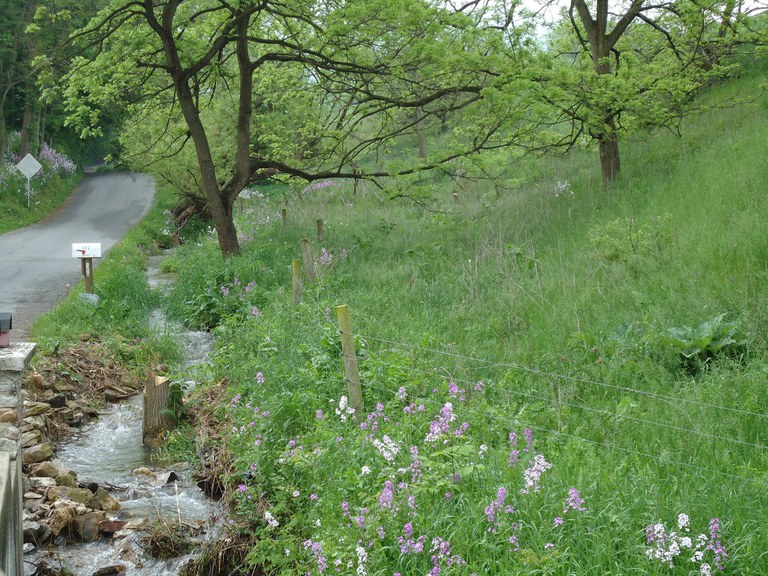Conservation projects and resources at two farms in Blair County: Ojala Farm and Mill Hill Dairy.
In May 2011 PA WAgN visited two farms in Blair County situated along Clover Creek: Mill Hill Farm and Ojala Farm. Both farms are recipients of the Pennsylvania Chesapeake Bay Clean Water Farm Award. At this field day we learned about about the individual ongoing efforts on both farms as well as projects supported by the USDA Natural Resources Conservation Services (NRCS).
At Mill Hill Dairy, Jim Biddle explained that although the historical aspect of their 200 year-old farm is interesting, he tries to remain focused on the future. His philosophy is centered around making sure the farm is set up to continue, which he thinks makes the history of the farm even more meaningful.
The Biddles are working toward this sustainable vision by adding 21st century conservation practices to increase the farm's profitability. The Biddles at Mill Hill Dairy have a long history of implementing best management practices that help reduce soil erosion, streambank protection, and nutrient loss.
Sarah Biddle and conservationists Rob Clauto and Rich Huether demonstrated the environmental practices that the Biddles have installed on their dairy farm over many years. Their newest project, a ½ acre bee pollinator area, includes native wildflowers and wildlife cover that will encourage greater pollination of crops at the same time it protects wildlife. Other projects include a composted manure bedding pack that allows a manure-sawdust mixture to compost over the winter months providing high-quality fertilizer and comfort for the cattle; paddocks and stream crossings for rotational grazing; and no-till crop production.
At Ojala Farm, we saw how grazing with fenced paddocks has made a small dairy farm profitable. Dave and Terry Rice moved to a grass-based seasonal dairy 15 years ago. They turn most of their milk into artisan aged raw-milk cheeses like gouda, cheddar, feta, and blue that are sold at the farm and at farmers' markets throughout the state.
We toured the grazing paddocks, milking barn, and cheesemaking facility and learned how their grass-based system has benefited their bottom line as well as their water and soil quality. Their farm model, with only 72-head of cattle, requires little equipment and fuel, an advantage in today's environment of rising fuel costs.
If you would like to fence paddocks for rotational grazing at your farm or add streambank fencing, water lines, or a high tunnel, you can learn about the funding available from the Natural Resource Conservation Service for these and other projects. And for new and beginning farmers (those farming for 10 years or less), NRCS will fund as much as 90% percent of the cost. For more information on conservation projects and support in PA, contact your local NRCS office:
http://www.pa.nrcs.usda.gov/contact/#Field_Office_Locations_Contact_Numbers
Pennsylvania Women's Agricultural Network
Address
302 Armsby BuildingUniversity Park, PA 16802
- Email pawagn@psu.edu
Pennsylvania Women's Agricultural Network
Address
302 Armsby BuildingUniversity Park, PA 16802
- Email pawagn@psu.edu


